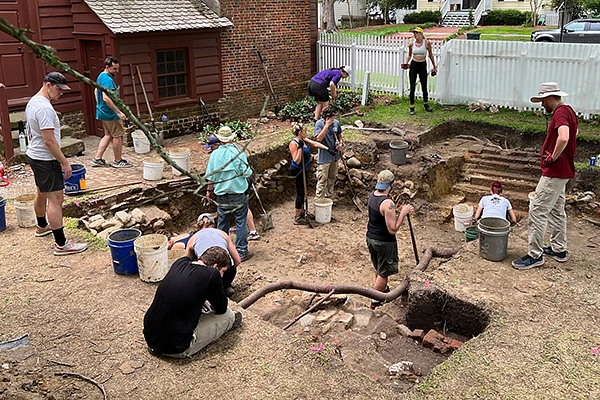East Carolina University students in the Thomas Harriot College of Arts and Sciences recently completed a month-long archaeology dig of one of the oldest structures in Bath, the oldest town in North Carolina. Over the past two decades, ECU archaeologists have excavated at numerous locations throughout the town, which was incorporated in 1705 and became North Carolina’s first port of entry in 1715.
Under the direction of Dr. Charles Ewen, anthropology professor and director of the Phelps Archaeology Lab, 15 undergraduate and three graduate students researched the north yard of the Palmer-Marsh house. Named after later owners, the Palmer-Marsh house was originally built around 1761 by successful naval store merchant Michael Coutanche, who moved to Bath in 1739.
A portion of the stone foundation in the yard of the Palmer-Marsh house was uncovered in 1960 by archaeologist Stanley South. At the time, it was hypothesized that the structure was Coutanche’s original dwelling that was torn down after a larger home was built next to it.
“Our excavations were undertaken to complete South’s work and determine the nature of the structure,” Ewen said, adding that preliminary findings in 2012 and 2013 suggested the structure was not a dwelling, but perhaps a storehouse or a dairy, due to the lack of a hearth or brick footings.
Chole Scattergood, anthropology graduate student specializing in historical archaeology, assisted with the supervision of the dig and is using the investigation as part of her master’s thesis on “An Eighteenth-Century Archaeology of Socioeconomics at Historic Bath, NC.” Scattergood will undertake a comparative study of the cellar in the Palmer-Marsh yard with another cellar located partially underneath the Intern house down the street.
“Based on our observations this summer, I’m inclined to stand by Dr. Ewen’s assertion. We failed to find any convincing evidence that there was once a residence associated with the cellar,” she said. “I believe our cellar most likely represents some sort of independent cold-storage facility employed by Michael Coutanche for commercial use.”
Scattergood was thrilled to be a part of this summer’s field school.
“The most exciting part of this year’s field school for me was having the opportunity to share my enthusiasm for archaeology with the undergraduates. It was such a pleasure being in the field while students could ask questions in real time about what we were finding and what it implied for the site itself,” she said. “I hope all the students this year left with more knowledge, more questions and more passion for archaeology than they had when they started.”
Betsy Williams, an undergraduate majoring in anthropology and art history who started the program’s Instagram page to document the excavation, said this was her first field school experience.
“You always go into something with preconceived notions in your head, and the dig was so much different than I had expected. It was interesting to see all the steps that go into planning, opening new units and even the techniques used to properly excavate,” she said. “I would say my favorite part of the dig was discovering the floor of the cellar and cleaning off the bricks. It was such meticulous work, and I loved it so much.
“Field school really helped me to get a better inside look at what being an anthropologist entails, and I am very thankful that I was provided with this opportunity,” Williams said.
Scattergood, who plans to pursue a career with a cultural resource management firm performing archaeological work and one day work for an office of state archaeology, will complete her master’s degree in spring 2023.
“I have had an overwhelmingly positive experience at ECU. The anthropology faculty have helped tremendously in translating my academic passions into an exciting thesis project, and all my coursework so far has been both engaging and rigorous,” Scattergood said. “The field school this summer has helped me truly hone my leadership skills and provided experience designing and leading an archaeological dig. All the skills, knowledge and friendships I’ve gathered at ECU will surely help me to succeed both in my career and in life.”
Skip past news feed


